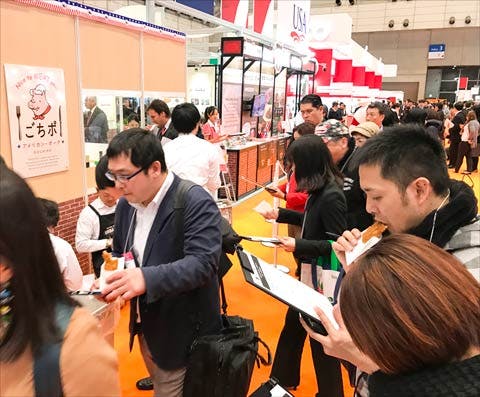U.S. Beef, Pork Showcased at FoodEx – Asia’s Largest Food Show
As U.S. exporters met with hundreds of buyers and representatives of Japan’s retail and foodservice industries at FoodEx Japan, USMEF promoted U.S. red meat by serving samples of U.S. beef tongue and thin-sliced and fried U.S. pork cutlets aimed at “on the go” customers. Funding for USMEF’s participation in the Tokyo show, which attracted 80,000 visitors, was provided by the USDA Market Access Program (MAP), the Beef Checkoff Program and the Pork Checkoff.

Buyers and traders discuss U.S. beef and pork inside the USMEF section of the USA Pavilion at FoodEx 2017 in Japan
“We had a very active show and we were able to reach many current customers and potential customers – it is Asia’s largest food show, so we see what our competition is doing, as well,” said Greg Hanes, USMEF assistant vice president for international marketing. “There was a steady stream of visitors to the USMEF booth and it often seemed that it was one of the busiest places at the show. The mix of attendees was amazing. It ranged from representatives of small importers or restaurants all the way to the presidents of some of the largest food companies in Japan – and in the world, for that matter.”

Visitors to FoodEx sample US. Beef and pork items at the USMEF booth inside the USA Pavilion
The USMEF kitchen was also busy, as chefs prepared U.S. beef and pork dishes for attendees to sample. Beef tongue is very popular in Japan and USMEF has been working to gain a larger share of that market, promoting the tenderness of corn-fed U.S. beef tongue over that of grass-fed competitors. Japan imported more than 19,000 metric tons of U.S. beef tongue in 2016, up 15 percent year-over-year, valued at $286 million - up 43 percent.*

Gochipo, the U.S. pork mascot in Japan, made several appearances at FoodEx 2017
A new concept offered to visitors was sous-vide style U.S. beef tongue.
“Our goal was to demonstrate the flavor and tenderness of U.S. beef tongue because many Japanese restaurants and foodservice companies are serving it. They are always looking for new and better ways to appeal to their customers and sous-vide style was a new and unique concept to them,” said Hanes. “The samples backed up what we have been telling them about the quality of U.S. beef tongue.”
On the pork side, USMEF prepared and distributed samples of Tonkatsu, one of the most beloved western-style foods in Japan – with a twist. For FoodEx visitors, USMEF used very thin slices of pork breaded with flour, egg and bread crumbs. The dish was deep-fried and served so that it could be easily eaten while walking.
“The Japanese market is very focused on convenience. This concept not only provided convenience, but also played to one of Japan’s favorite pork dishes,” he said. “It’s sort of like a comfort food and our chefs did a really spectacular job with it.”
Hanes said popular topics at this year’s FoodEx were the availability of chilled red meat and the importance of branding. USMEF member companies could discuss these issues with buyers and learn about their needs.
“This was my first time at FoodEx and I was amazed by the marketplace and the potential we have there,” said John Majchrowicz, chief operating officer at Meats by Linz, a family-owned meat purveyor based in Illinois. “More than anything, I want to thank USMEF and USDA, as they made my job so much easier with all the support we received during the show.”
Those with more experience at FoodEx said the event keeps getting better.
“We’ve been coming to FoodEx for 20 years as it is a great venue to not only see our existing customers but to meet other interested companies in Japan,” said Avy Konor, director of international business at Sugardale, an Ohio-based company that provides smoked and processed meats to the retail sector.
*Editor's note: this article was recently updated using Japanese import data rather than U.S. export data, because it more accurately captures the full volume and value of both chilled and frozen beef tongue shipments to Japan.
